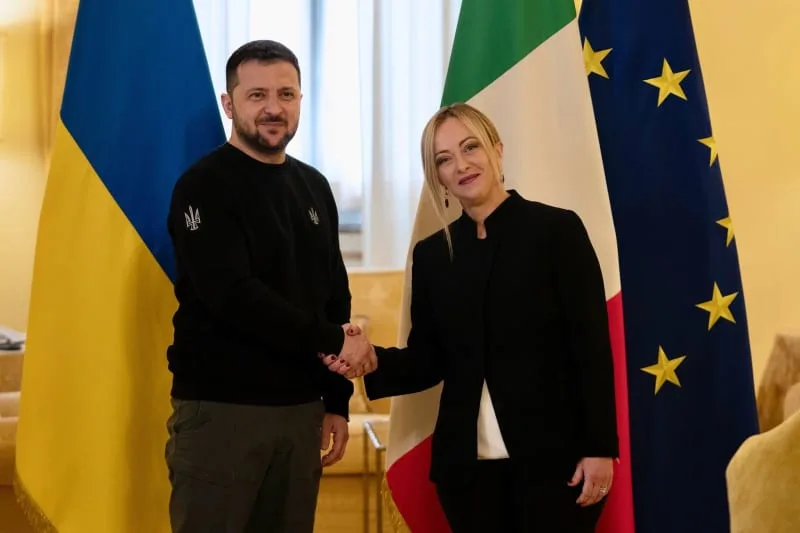Ukraine’s President Seeks Additional Military Aid from European Allies at Italian Forum
In a continued effort to rally international support, Ukrainian President Volodymyr Zelensky met with Italian Prime Minister Giorgia Meloni on Saturday in northern Italy. The meeting, held on the sidelines of the European House-Ambrosetti forum in Cernobbio, came as Zelensky urged European allies for increased military aid in his country’s defense against the ongoing Russian invasion.
Italy has been a strong ally of Ukraine throughout the conflict, supplying essential military equipment under the condition that it remains deployed on Ukrainian soil. Meloni’s steadfast support reflects the broader Western coalition’s commitment to bolstering Ukraine’s ability to defend itself against Russian aggression.
Zelensky’s trip to Italy followed a high-profile gathering at the U.S. Ramstein Air Base in Germany on Friday, where the Ukrainian leader pressed his case for more military assistance. The U.S. responded with the announcement of an additional $250 million in military aid. This latest package includes ammunition and equipment to further enhance Ukraine’s defense capabilities. During the same visit, Zelensky also met with German Chancellor Olaf Scholz, seeking to reinforce the unity of European nations behind Ukraine’s cause.
As the war enters its third year, Russian forces continue their assault on eastern Ukraine, with particular focus on the Donbas region. Russian President Vladimir Putin has declared the capture of Donbas as his “primary objective,” intensifying the conflict in an area already devastated by the war.
Zelensky’s push for more military support comes as Moscow’s advances in Donbas signal an escalation in the conflict. Russian troops are gaining ground, and the Ukrainian government is warning that additional aid is critical to counteracting the offensive. President Zelensky’s plea for more advanced weaponry underlines the urgency of the situation.
Prime Minister Meloni, who was scheduled to speak at the forum on Saturday, reiterated Italy’s unwavering support for Ukraine. Italy has been consistent in its stance, supplying weapons and logistical support to Ukraine, while emphasizing that these arms should not be used offensively on Russian soil.
The European House-Ambrosetti forum, a prestigious gathering of political and business leaders, provided a critical platform for Zelensky to amplify his message. However, the event was not without controversy. Hungarian Prime Minister Viktor Orban, who has drawn sharp criticism from other European Union leaders for his meeting with Putin in July, was also in attendance.
Orban’s relationship with Moscow has been a sore point for EU unity, with the Hungarian leader repeatedly calling for a ceasefire. At Cernobbio, Orban reiterated his stance, suggesting a pause in hostilities. However, Zelensky firmly rejected these calls, stating that Russia has failed to honor previous peace agreements and that any ceasefire without a complete Russian withdrawal would only serve to prolong the conflict.
“Putin has never respected earlier accords,” Zelensky stated, underscoring his belief that negotiations with Russia, without a fundamental shift in its approach, would be futile. He stressed the need for continuous support from Ukraine’s allies, warning that any wavering in assistance could lead to further Russian advances, endangering not only Ukraine but also European stability.
As European leaders debate the next steps in supporting Ukraine, the stakes continue to rise. Moscow’s determination to seize the Donbas region reflects its broader ambition to weaken Ukraine’s sovereignty and undermine the unity of the European Union. Meanwhile, Ukraine remains resilient in its defense, but the need for sustained international support has never been more pressing.
Zelensky’s diplomatic offensive at the forum and his broader campaign across Europe highlight the delicate balance of maintaining international unity while managing internal divisions within the EU, as leaders like Orban advocate for a more conciliatory approach toward Russia.
As the conflict grinds on, the future of Ukraine and the stability of the European continent hinge on decisions made in forums like Cernobbio, where leaders must weigh the cost of prolonged war against the principles of sovereignty and self-determination. For Ukraine, the message remains clear: more military support is essential to repelling Russian aggression and preserving its territorial integrity.



